Theology of the Old Testament Collection (11 vols.)
Digital Logos Edition
Overview
What does the book of Job say about the problem of evil? What do the eschatological writings in the Old Testament tell us about God and the world? What do we mean when we call God “King”? How do God’s mandates for Israel’s holiness and the rules in the Torah apply to Christians today?
The Old Testament is freighted with theological language. It establishes the parameters for how we are to relate to God, and reveals a centuries-long history of God’s relationship with his people. The Old Testament reveals not only God’s creation and humanity’s fall, but also the world’s need for a Savior. It establishes the foundation on which Christian theology is based, and speaks to modern assumptions about God and the world. That makes understanding Old Testament theology vital for theologians and pastors in today’s church.
The Theology of the Old Testament Collection contains 11 volumes of scholarship on the Old Testament. In addition to book-length studies, this collection also contains collected volumes of essays, articles, and shorter studies—more than 150 in all. Contributors include F. F. Bruce, Walter Brueggemann, John Rogerson, Philip R. Davies, Stanley Porter, and numerous other top biblical scholars.
With the Logos Bible Software edition, all Scripture references are linked to the original language texts and the English Bibles in your library. By employing the advanced search features in Logos, you can find the exact theological topics, Scripture references, and subjects you’re looking for. Whether you’re studying what the Old Testament says about theological topics, or you’re researching the development of theological themes in the Bible, the Logos Bible Software edition is right for you. Pastors, students, theologians, and biblical scholars will benefit from these important resources.

- Clear exposition of theological topics in the Bible
- Book-length studies, plus over 150 essays, scholarly articles, and shorter studies
- Contributions from F. F. Bruce, Walter Brueggemann, John Rogerson, Philip R. Davies, Stanley Porter, and numerous other top biblical scholars
- All Scripture references linked to the original language texts and English Bible translations in your library
- Title: Theology of the Old Testament Collection
- Publisher: T & T Clark and Sheffield Academic
- Volumes: 11
- Pages: 4,022
This title is included in the following collections
You can save when you purchase this product as part of a collection.
Logos 8 Messianic Jewish Diamo...
$2,999.99$2,999.99Logos 9 Messianic Jewish Diamo...
$2,999.99$2,999.992025 Lutheran Portfolio
$4,749.99$4,037.492025 Messianic Jewish Portfoli...
$4,749.99$4,037.49
- $4,749.99
- $4,749.99
- $4,749.99
- $4,749.99
- $4,999.99
- $7,749.99
- $23,999.99$20,399.99
- $21,749.99
- $24,999.99
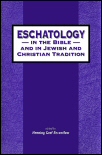
This is the fourth volume in the series of collaborations between the Department of Bible in Tel Aviv University, Israel, and the Faculty of Theology in the University of the Ruhr, Bochum, Germany. This symposium, held in Bochum in 1995, discussed a topic important for both communities of believers, starting with the Bible and tracking its role through the different stages of the respective tradition-histories. This time the theme was eschatology. The participants engaged in a lively discussion (from the Jewish side) on messianism and Zionism, Qumran, Mishnah and Kabbalah, and (from the Christian side) on the Bible, recent Protestant ethics and systematic theology. The volume concludes with the report of a panel discussion on the essence of eschatology in Jewish and Christian thinking: is it a spiritualized idea or a material expectation for the world?
Contributions to this volume include:
- “Messianism and Zionism,” Yehoshua Amir
- “Early Christian Faith as ‘Hope against Hope’,” Horst Balz
- “Not All is in the Hands of Heaven: Eschatology and Kabbalah,” Rachel Elior
- “Eschatology and Ethics: Their Relations in Recent Continental Protestantism,” Christofer Frey
- “Eschatology in the Book of Jeremiah,” Yair Hoffman
- “The Son of Man and the Angels: Reflections on the Formation of Christology in the Context of Eschatology,” Gottfried Nebe
- “Eschatological Motives in Qumran Literature: The Messianic Concept,” Bilhah Nitzan
- “Leadership and Messianism in the Time of the Mishnah,” Aharon Oppenheimer
- “The Eschatologization of the Prophetic Books: A Comparative Study,” Henning Graf Reventlow
- “Character and Function of Divine Sayings in the Elijah and Elisha Traditions,” Winfried Thiel
- “From Prophetic to Apocalyptic Eschatology,” Benjamin Uffenheimer
- “Expectations of the Divine Kingdom in Biblical and Postbiblical Literature,” Moshe Weinfeld
- “Aspects of the Last Judgment in the Gospel according to Matthew,” Klaus Wengst
Henning Graf Reventlow is Professor Emeritus of Old Testament Exegesis and Theology, Faculty of Protestant Theology, University of the Ruhr, Bochum, Germany.
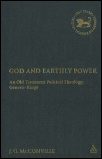
In God and Earthly Power, J. G. McConville considers the nature of human power in the light of belief in God. The Bible, and especially the Old Testament, is relevant to the question, not least because perceptions about the use of power in relation to God are often derived correctly or incorrectly from it. This book thus aims to address a world in which God’s power is often invoked, from quite different quarters, in order to justify political and military action.
McConville’s interpretation of the Old Testament focuses on Deuteronomy and the narrative in which it is set, because these are especially fruitful for political thinking. His case is argued for both exegetically and in relation to the actual use of the Old Testament in the history of political thought. McConville’s core argument is that divine power, mediated through Torah, results in human freedom and a mandate for the political responsibility of citizens. Indeed, it is even the best guarantee of these.
Table of Contents:
- The Problem of God in Human Policy
- The Old Testament in Biblical Theology and Ethics
- Mediations of Power in the Old Testament
- An Old Testament Political Theology
- Old Testament Political Theology and Christian Political Thought
- Conclusions
J. G. McConville is Professor of Old Testament Theology in the University of Gloucestershire, UK. He has written extensively on Old Testament theology with a special focus on Deuteronomy, and has recently written a major commentary on that book.
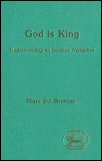
This is the first attempt in biblical studies to apply the tools developed by theoreticians of metaphor to the common biblical metaphor of God as king. The extent to which elements of human kingship are projected onto God is investigated, and several significant conclusions emerge:
- Royal characteristics that have a diminutive connotation are generally not projected onto God.
- God's nature as greatest king is emphasized through use of superlatives. For example, his garb is enormous and he has a large number of royal attendants. God is not limited by the metaphor.
- When the entailments of the metaphor would have conflicted with Israelite proscriptions, such as the iconic prohibition, the metaphor is avoided.
- The metaphor is predominant enough to influence Israel's depiction of human kingship. For example, the term gadol (“great,” “majestic”) is appropriated by God the king and is not used of the Israelite king.
- There is no single metaphor 'God is king'; as Israelite kingship changes, the metaphor undergoes parallel changes. Also, biblical authors emphasize different aspects of God's kingship in specific contexts.
The lack of a complete fit between human kingship (the vehicle) and God as king (the tenor) is consistent with the tensive view of metaphor, which predominates in contemporary scholarship. The literary study has other benefits. By enumerating the parallels between human and heavenly messengers, it finds that angels should be construed as projections of royal officials. The analysis of human enthronement rituals as they are projected onto God suggests that there was no annual enthronement festival which celebrated God becoming king. The systematic study of the metaphor also opens new avenues for exploring a number of issues in the study of Israelite religion.
Marc Zvi Brettler is Dora Golding Professor of Biblical Studies and chair of the Department of Near Eastern and Judaic Studies at Brandeis University.
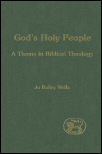
God’s Holy People focuses on the character of Israel, and examines the relationship between Israel and the nations as a framework for understanding Christian mission. God mandates holiness for Israel—Israel must be different from other peoples, because Israel belongs to Yahweh. Yet what does it mean to be a holy nation and a priestly kingdom? This book addresses two questions: What does holiness mean, and what to the dynamics of holiness in Scripture say about reading Scripture? Holiness, according to Jo Bailey Wells, focuses on faithful adherence to God’s covenant in all aspects of worship and life.
. . . A useful analysis of a familiar biblical theme that is not often studied. . . . I recommend to scholars and students.
—Catholic Biblical Quarterly
Bailey Wells is to be commended for the careful, fresh and hermeneutically alert approach to this familiar biblical theme.
—Biblical Interpretation: A Journal of Contemporary Approaches
Jo Bailey Wells is Professor of Old Testament and the director of Anglican Studies at Duke Divinity School.
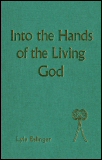
Into the Hands of the Living God is Lyle Eslinger's second study of Deuteronomistic literature. This book is devoted to studies of key texts (Joshua 1–9; Judges 1–2; 1 Samuel 12; 1 Kings 8; 2 Kings 17) or concepts (the success/failure of the conquest; the exile and theodicy) in these narratives. Eslinger's readings are unorthodox and challenging, both for readers from the communities of faith and for critical scholarship. The Deuteronomistic narratives are here shown to be far from being a vindication of the ways of God at Israel's expense. Rather, in these narratives God, no less than Israel's leaders, has his hands soiled in the machinations that end in Babylon. What the Deuteronomistic history offers is, rather, dispassionate analysis of the problems, some unavoidable, that predetermined the failure of the covenant relationship. The collection of carefully worked out close readings of the biblical text in this volume provides a new critical vantage point from which one can reassess conventional historical-critical readings of these colorful books.
Lyle Eslinger received his Ph.D. from McMaster University. He is Professor of Western Religions at the University of Calgary.
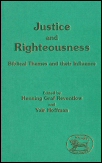
This volume publishes the symposium papers of a joint conference held in Bochum, Germany in 1990 between the University of Tel Aviv, Israel, and the University of the Ruhr, Bochum. The aim of the conference was to show that the close cooperation of Jewish and Christian biblical scholars can help both sides to a deeper understanding of their common biblical heritage. This collection focuses in particular on the theme of “Justice and Righteousness.” This volume is also a Festschrift for Benjamin Uffenheimer, who was instrumental in forming the symposium.
Contributions to this volume:
- “Land and Justice,” Shmuel Ahituv
- “Measure for Measure in Talmudic Literature and the Wisdom of Solomon,” Yehoshua Amir
- “The Jubilee Law—An Attempt at Instituting Social Justice,” Yairah Amit
- “The Development of Some Laws in the Book of the Covenant,” Gershon Brin
- “Theodicy in the Book of Qohelet,” Pin’has Carny
- “Law and Ethics in the Hebrew Bible,” Ze’ev W. Falk
- “The Impact of the Biblical Idea of Justice on Present Discussions of Social Justice,” Christopher Frey
- “Observations on Some Recent Hypotheses Pertaining to Early Israelite History,” Siegfried Herrmann
- “The Creativity of Theodicy,” Yair Hoffman
- “Righteousness in Paul,” Gottfried Nebe
- “Reflections about Social Justice within the Ecumenical Movement,” Konrad Raiser
- “Righteousness as Order of the World: Some Remarks towards a Programme,” Henning Graf Reventlow
- “Moshe Hayyim Luzzatto’s Thoughts against the Background of Theodicy Literature,” Rivka Schatz-Uffenheimer
- “Theodicy and Ethics in the Prophecy of Ezekiel,” Benjamin Uffenheimer
- “Justice and Righteousness: The Expression and its Meaning,” Moshe Weinfeld
Henning Graf Reventlow is Professor Emeritus of Old Testament Exegesis and Theology, Faculty of Protestant Theology, University of the Ruhr, Bochum, Germany.
Yair Hoffman is an Emeritus Professor of Bible at Tel-Aviv University. He has published books on various biblical topics such as the Exodus, prophecies against foreign nations, Job, and Jeremiah.
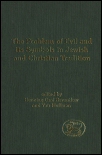
The existence of evil in the world represents one of the most complex problems for those who believe in God. Here, a range of Jewish and Christian contributors examine the issue of evil in the Bible and its impact on Judaism and Christianity from a variety of perspectives. For example, how has Jewish mysticism explained evil, and what were Luther's thoughts on the topic? The dialogue between specialists from different fields allows a broad overview of this problematic issue.
Contributions to this volume include:
- “Evil in the Book of Kings,” Winfried Thiel
- “Jeremiah 50–51 and the Concept of Evil in the Hebrew Bible,” Yair Hoffman
- “The Wrath at God in the Book of Lamentations,” Edward L. Greenstein
- “Evil and Its Symbols in Psalm 14, 52, 36, 12,” Osnat Singer
- “The Evil Ones and the Godless: A Prophecy of Identity in Biblical Wisdom,” Henning Graf Reventlow
- “The Devil in the Revelation of St. John,” Klaus Wengst
- “Evil in the World of Religions,” Hans-Peter Hasenfratz
- “Evil and Its Symbols in the Qumran Scrolls,” Bilha Nitzan
- “The Concept of Evil and Its Sanctification in Kabbalistic Thought,” Yoram Jacobson
- “Augustine and Luther on Evil,” Dietmar Wyrwa
- “Good and Evil in Ethics,” Christofer Frey
- “The Riddle of Evil: The Auschwitz Question,” Christian Link
- “Evil: A Topic for Religious Education?” Franz-Heinrich Beyer
- “The Question of Evil in Israeli Holocaust Fiction,” Yochai Oppenheimer
Henning Graf Reventlow is Professor Emeritus of Old Testament Exegesis and Theology, Faculty of Protestant Theology, University of the Ruhr, Bochum, Germany.
Yair Hoffman is an Emeritus Professor of Bible at Tel-Aviv University. He has published books on various biblical topics such as the Exodus, prophecies against foreign nations, Job, and Jeremiah.
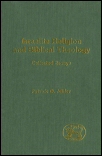
This is a formidable collection of previously published essays by this distinguished Old Testament scholar. Three significant areas of biblical studies have been a focus of the author's attention throughout his career: the Bible in its ancient Near Eastern world, the Psalms, and Old Testament theology. In Part 1, epigraphic discoveries are examined for the light they shed on biblical texts. In Part 2, special attention is given to the theological significance of reading the Psalms as a collection. In Part 3, a wide range of theological issues—creation, covenant, prayer, cosmology, canon, and especially the nature and character of God—are taken up in various essays that suggest how biblical theology can contribute to the larger theological enterprise.
Essays included in this volume:
- “Israelite Religion”
- “Wellhausen and the History of Israel’s Religion”
- “Psalms and Inscriptions”
- “The Theological Significance of Biblical Poetry”
- “Meter, Parallelism, and Tropes: The Search for Poetic Style”
- “Poetic Ambiguity and Balance in Psalm 15”
- “The Beginning of the Psalter”
- “Kingship, Torah Obedience, and Prayer: The Theology of Psalms 15–24”
- “Psalm 73 as a Canonical Marker”
- “The End of the Psalter: A Response to Erich Zenger”
- “Deuteronomy and the Psalms: Evoking a Biblical Conversation”
- “Prayer as Persuasion: The Rhetoric and Intention of Prayer”
- “Dietrich Bonhoeffer and the Psalms”
- “God the Warrior: A Problem in Biblical Interpretation and Apologetics”
- “God and the Gods: History of Religion as an Approach and Context for Bible and Theology”
- “The Divine Council and the Prophetic Call to War”
- “The Sovereignty of God”
- “Cosmology and World Order in the Old Testament: The Divine Council as a Cosmic-Political Symbol”
- “Prayer and Divine Action”
- “Creation and Covenant”
- “Syntax and Theology in Genesis 12.3a”
- “The World and Message of the Prophets: Biblical Prophecy in its Context”
- “The Prophetic Critique of Kings”
- “The Wilderness Journey in Deuteronomy: Style, Structure, and Theology in Deuteronomy 1–3”
- “God’s Other Stories: On the Margins of Deuteronomic Theology”
- “The Canon in Contemporary American Discussion”
- “Faith and Ideology in the Old Testament”
- “The Old Testament and Christian Faith”
- “Toward a Theology of Leadership: Some Clues from the Prophets”
- “Judgment and Joy”
- Many more!
Patrick Miller is Professor of Old Testament Theology in the Department of Biblical Studies at Princeton Theological Seminary.
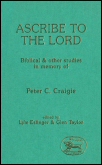
This volume contains dozens of scholarly essays written and published in honor of Peter Craigie, who died on September of 1985. Cragie wrote seven books and more than forty articles at the time of his death at the age of forty seven years of age, and he influences a generation of biblical scholars. As a prolific writer and an astute scholar, Craigie wrote in the field of Old Testament studies. The essays in this volume were written by his students, and testify to his influence in the field.
Contributors to this volume include:
- “The Lesson of Proverbs 26:23,” H. H. P. Dressler
- “Genealogy and History in Ancient Israel,” W. E. Aufrecht
- “Word of God and Word of Man: Prophets and Canon,” G. Auld
- “Has Yahweh Cursed the Ground? Perplexity of Interpretation in Genesis 1–5,” E. Combs
- “Psalm 88 Among the Complaints,” R. C. Culley
- “A Change of Heart: 1 Samuel 16,” L. Eslinger
- “Pursuit of the Inscrutable: A Literary Analysis of Psalm 23,” C. M. Foley
- “The Two Faces of Job: Imagery and Integrity in the Prologue,” R. W. E. Forrest
- “On Evil in the Book of Job,” J. C. L. Gibson
- “Israel in the Song of Deborah,” J. Gray
- “On Taking Renewal Seriously: 1 Samuel 11:1–15,” R. Polzin
- “Can a Doctrine of Providence be Based on the Old Testament?” J. Rogerson
- “The Two Earliest Known Representations of Yahweh,” J. G. Taylor
- “The Light and the Dark,” S. Walters
- Many more!
Lyle Eslinger received his Ph.D. from McMaster University. He is Professor of Western Religions at the University of Calgary.
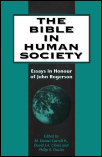
The Bible in Human Society was published on the occasion of John Rogerson’s retirement in 1995. Rogerson chaired the biblical studies department at the University of Sheffield. His writings are found in both scholarly and lay publications, and his teaching took place in both the halls of the academy and in the pews of churches throughout the UK. This book aims to capture Rogerson’s intellectual passions for making the Bible enlightening for scholars and accessible for laypeople.
Contributions to this volume include:
- “Narrative Maps: Reflections on the Toponymy of Acts,” Loveday Alexander
- “The First Christian Moral Legislation,” C. K. Barrett
- “The Political Ethics of Postmodern Allegory,” Mark G. Brett
- “Five Strong Rereadings of the Book of Isaiah,” Walter Brueggemann
- “Reflecting on War and Utopia in the Book of Amos: The Relevance of a Literary Reading of the Prophetic Text for Central America,” M. Daniel Carroll
- “The Hungry Knife: Towards a Sense of Sacrifice,” Bruce Chilton
- “Wisdom, Virtue and the Human Condition,” R. E. Clements
- “Psalm 2 and the Moabite Liberation Front,” David J. A. Clines
- “A Future for Eschatology?” John M. Court
- “Rebounding Vitality: Resurrection and Spirit in Luke–Acts,” Douglas J. Davies
- “On Prostitution,” Margaret Davies
- “Making It: Creation and Contradiction in Genesis,” Philip R. Davies
- “Bne Brit? Hebrew, English, and the English,” John Elwolde
- “Michael at the Movies,” J. Cheryl Exum
- “Some Ancient Jewish Reflections on Israel’s Imminent Redemption,” Robert Hayward
- “Theodore of Mopsuestia and the Interpretation of Ecclesiastes,” John Jarick
- “Reading in Canon and Community: Deuteronomy 21:22–23, A Test Case for Dialogue,” Judith M. Lieu
- “Liberation from the Powers: Supernatural Spirits or Societal Structures?” Andrew T. Lincoln
- “Schopfung, Zivilisation und Befreiung,” Hans-Peter Muller
- “A Newer Perspective on Paul: Romans 1–8 through the Eyes of Literary Analysis,” Stanley E. Porter
- “Psalm 95: If Only You Will Listen to His Voice!” W. S. Prinsloo
- “Computing Times, Ages and the Millennium: An Astrologer Defends the Bible: William Whiston (1667–1752) and Biblical Chronology,” Henning Graf Reventlow
- “Zum Verhaltnis von Literaturwissenschaft, Linguistik und Theologie,” Wolfgang Richter
- “The ‘Interested’ Interpreter,” Christopher Rowland
- “Reading the Bible and Doing Theology in the New South Africa,” Gerald West
David J. A. Clines is Professor of Biblical Studies and Head of Department in the University of Sheffield.
Philip R. Davies is Professor of Biblical Studies in the University of Sheffield, UK.
Robert Carroll is Professor of Hebrew Bible and Semitic Studies in the Department of Theology and Religious Studies at the University of Glasgow.
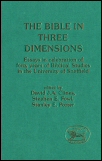
The Bible in Three Dimensions celebrates the contribution to the field of biblical studies from the University of Sheffield—initially under the leadership of F. F. Bruce and then John Rogerson. This volume is divided into three sections: literary readings of the Bible, studies in the social world of Israel and early Christianity, and questions of method.
Contributions to this volume include:
- “Biblical Studies at Sheffield,” J. W. Rogerson
- “The Department of Biblical Studies: the Early Days,” F. F. Bruce
- “Reading Esther from Left to Right: Contemporary Strategies for Reading a Biblical Text,” D. J. A. Clines
- “Reading Right: Reliable and Omniscient Narrator, Omniscient God, and Foolproof Composition in the Hebrew Bible,” D. M. Gunn
- “Zion in Transformation: A Literary Approach to Isaiah,” B. G. Webb
- “Lot as Jekyll and Hyde: A Reading of Genesis 18–19,” L. A. Turner
- “Matthew: A Story for Teachers?” A. T. Lincoln
- “The Parable of the Unjust Steward: Irony is the Key,” S. E. Porter
- “The Figurative Aspect and the Contextual Method in the Evaluation of the Solomonic Empire (1 Kings 1–11),” K. L. Younger
- “Deviance and Legitimate Action in the Book of Judges,” D. J. Chalcraft
- “The Prophet and his Editors,” R. E. Clements
- “The Living Voice: Skepticism towards the Written Word in Early Christian and in Graeco-Roman Texts,” L. Alexander
- “Baptism in the First-Century Churches: A Case for Caution,” C. J. A. Hickling
- “A Coin of Three Realms (Matthew 17:24–27),” B. D. Chilton
- “What Does it Mean to be Human? The Central Question of Old Testament Theology,” J. W. Rogerson
- “Reading ‘the Text’ and Reading ‘Behind-the-Text’: The Cain and Abel Story in a Context of Liberation,” G. West
- “Do Old Testament Studies Need a Dictionary?” P. R. Davies
- “On Models and Methods: A Conversation with Robert Morgan,” A. C. Thiselton
Forty years of biblical studies at Sheffield provide cause for celebration and this book is an excellent expression of it. . . . There is a good balance between Old Testament and New Testament . . . [and] eighteen essays in the book altogether . . . all highly readable and informative. Sheffield is to be congratulated on its forty years, on this self-provided Festschrift, and more generally, on its phenomenal contribution to publishing in the biblical field.
—W. D. Stacey, Journal of Theological Studies
About the Authors
David J. A. Clines is Professor of Biblical Studies and Head of Department in the University of Sheffield.
Stanley E. Porter is Principal, Dean and Professor of New Testament, McMaster Divinity College, Canada.
Stephen E. Fowl is professor of theology at Loyola College in Maryland. His previous books include The Story of Christ in the Ethics of Paul, Reading in Communion (with L. Gregory Jones), and Engaging Scripture.